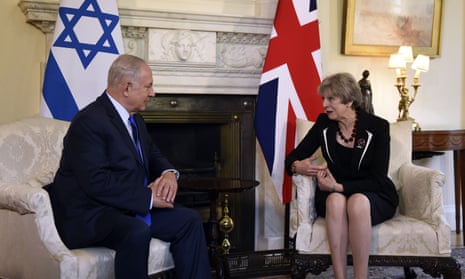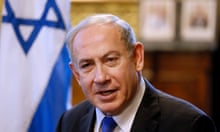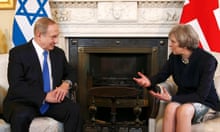Theresa May has said that Britain is “proud of our pioneering role in the creation of the state of Israel” at a gala dinner in London to commemorate the 100th anniversary of the Balfour declaration.
The Israeli prime minister, Benjamin Netanyahu, and a host of dignitaries attended a dinner on Thursday evening to celebrate the Balfour declaration of 1917, a statement that offered Britain’s support for “the establishment in Palestine of a national home for the Jewish people”. It was seen as the first international recognition of the need for a homeland for the Jews and went on to form the basis of Britain’s mandate for Palestine in the 1920s.
In her speech, May said Britain was proud “of the relationship we have built with Israel” and called for “renewed resolve to support a lasting peace that is in the interests of both Israelis and Palestinians”.
The prime minister discussed the chances of a peace settlement, saying: “There will need to be compromises from each side if we are to have a realistic chance of achieving this goal – including an end to the building of new settlements and an end to Palestinian incitement, too.
“But as we work together towards Balfour’s vision of a peaceful co-existence, we must be equally clear that there can never be any excuses for boycotts, divestment or sanctions: they are unacceptable and this government will have no truck with those who subscribe to them.”
Thousands of Palestinians in the West Bank city of Ramallah marched from the city centre to the British consulate, with many waving black flags and banners with slogans such as “100 years of dispossession”.
During talks between the two leaders earlier in the day, May told her Israeli counterpart that illegal settlements in Palestinian territories remained “an obstacle to peace”. She said Britain was committed to a two-state solution with a viable Palestinian state, and wanted to discuss “what we see as some of the barriers and some of the difficulties, like the illegal settlements, in relation to that peace process”.
Netanyahu, who is on a five-day visit to London, said in Downing Street: “Israel is committed to peace, I’m committed to peace. A hundred years after Balfour, the Palestinians should finally accept a Jewish national home and finally accept a Jewish state. And when they do, the road to peace will be infinitely closer. In my opinion, peace will be achievable.”
The Foreign Office knows that the Balfour declaration – seen as the Magna Carta of Jewish liberation by its supporters – represents a diplomatic minefield. It has tried to adopt a balanced approach, celebrating the role of the former British foreign secretary Arthur Balfour in the establishment of the state of Israel, but added that the 1917 declaration included a commitment to protect the rights of the Palestinian people, which the UK says remains unfulfilled.

The declaration said the British government viewed with favour “the establishment in Palestine of a national home for the Jewish people” so long as it did not “prejudice the civil and religious rights of existing non-Jewish communities”.
Emily Thornberry, the shadow foreign secretary, stood in for the Labour leader, Jeremy Corbyn, at the celebration dinner. Corbyn said he could not attend because of pre-existing engagements, which has been read as a snub by some in Israel and in the British Jewish community.
In a statement, the Labour leader called on the British government to recognise Palestine. He said: “Balfour promised to help establish a national home for the Jewish people in Palestine while pledging that nothing would be done to prejudice the rights of its ‘existing non-Jewish communities’,” – a reference to the Palestinian Arabs who then made up 90% of the population.
“A hundred years on, the second part of Britain’s pledge has still not been fulfilled and Britain’s historic role means we have a special responsibility to the Palestinian people, who are still denied their basic rights.
“So let us mark the Balfour anniversary by recognising Palestine as a step towards a genuine two-state solution of the Israel-Palestine conflict, increasing international pressure for an end to the 50-year occupation of the Palestinian territories, illegal settlement expansion and the blockade of Gaza.”
Manuel Hassassian, in effect the chief Palestinian diplomat to the UK, chastised the UK government’s approach, saying it should apologise for the Balfour declaration, not celebrate it.
Speaking on BBC Radio 4, he said: “The 67-word letter meant the destruction and destitution of the Palestinian people [and] bringing the Jews from Europe to Palestine – that is a crime against humanity. That is how we look at the Balfour letter.”
He said the second part of Balfour’s letter has never been fulfilled.
Hassassian said his remarks did not represent a rejection of the state of Israel. “Today we are not talking about the extermination of Israel … Instead of celebrating, marking and adding insult to injury, we Palestinians would have expected the moral and historic responsibility to be shouldered by the British government to apologise to the Palestinian people and to recognise the state of Palestine.”
He called the UK’s commitment to recognise a future Palestinian state “a hollow promise”, claiming no practical pressure had been put on Israel over its illegal settlements. Britain, he said, was “talking the talk but not walking the walk. The two-state Palestinian solution is slipping because of the continuous building of settlements by the Israelis.”
In Jerusalem, Palestinians delivered letters written by students to the British consulate on Thursday, asking why Britain had not recognised a Palestinian state. The letter, addressed to May, said if it had not been for the Balfour declaration, their lands would not have been “stolen”.The UK has repeatedly rejected calls to apologise for the declaration and drawn back from recognising a Palestinian state, despite a House of Commons votie three years ago to do so. The Foreign Office says the time was not ripe to recognise Palestine, but did not set out the precise conditions that the Palestinians would have to meet for recognition to be offered.










